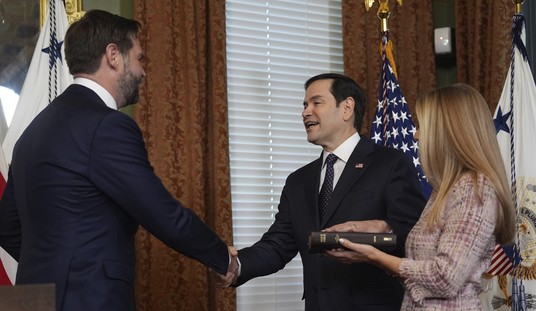Russia’s decision to help Syrian President Bashar al-Assad isn’t sitting too well with Secretary of State John Kerry. He told reporters on Sunday in Germany he believed Russia’s involvement would just attract more jihadis.
“I agreed that continued military support for the regime by Russia or any other country risks the possibility of attracting more extremists and entrenching Assad and hinders the way for resolution.”
The Obama Administration still has yet to explain why they were friends with Assad before deciding he was an imminent threat to the region. But the other strange thing is how Kerry calls Assad’s departure something which can be talked out.
“We need to get to the negotiation. That is what we’re looking for and we hope Russia and Iran, and any other countries with influence, will help to bring about that, because that’s what is preventing this crisis from ending…It doesn’t have to be on day one or month one. There is a process by which all the parties have to come together and reach an understanding of how this can best be achieved.”
The Administration is probably pushing for talks instead of military action because of how Americans criticized the desire to start bombing Syria in 2013. It really doesn’t make sense to give military support to the rebels. For one, Assad is fighting groups like ISIS which obviously aren’t pro-America. Since this is the case, it would make more sense for the U.S. to stay out of the conflict and let the bad guys kill other bad guys as Rand Paul suggested in last week’s GOP debate. It would hurt the non-ISIS rebels in Syria, but Reuters reports Arab states may end up filling the void left by the Americans.
“It is in our calculations that the battle will now extend for more years than it would have without the Russians,” said Abu Yousef al-Mouhajer, a rebel fighting in the Latakia area where Russian forces have deployed at an airfield.
“The Russian intervention has come to save the regime,” said the fighter with the Ahrar al-Sham group, part of an alliance that has advanced in the Assad-held west.
One thing about the Ahrar al-Sham group is they have al Qaeda operatives as members. This is just another reason why the U.S. shouldn’t be involved in Syria. The Long War Journal wrote in 2013 how Ahrar al-Sham had a pretty cozy relationship with al Qaeda.
Ahrar al Sham is not one of al Qaeda’s two official branches inside Syria, which are the Al Nusrah Front and the Islamic State of Iraq and the Sham, or Levant (ISIS) . But Ahrar al Sham has closely cooperated with the al Qaeda affiliates on the battlefield even while engaging in a very public dispute with ISIS.
The other troublesome part is the fact another large rebel group in Syria, Jaysh al-Islam, also appears to be full of militant Islamists. The group even called Al Nusra their brothers who they’d have no problem fighting alongside. This is pretty amusing because Saudi Arabia started funding Jaysh al-Islam to counter Al Nusrah. But the group’s two ties are obviously not an obstacle for Saudi Arabia who is still heavily involved with the rebels. Here’s the interesting part in all this. The rebels seem to think Saudi Arabia’s support may be enough because of Russia’s decision to back Assad.
“A serious Russian intervention in Syria – beyond the reports we are hearing – will represent a continuation of the struggle,” said Abu Ghiath al-Shami, spokesman for Alwiyat Seif al-Sham, a “Free Syrian Army” rebel group in southern Syria. “Russia has no aim for a political solution. It only wants the preservation of the Syrian regime. As for the states that support us, … I think there will be a change in their attitude towards us, via support, or perhaps a political shift.”
If this is truly the case, then the U.S. just shouldn’t get involved in supporting rebel groups. Let the two sides fight and try to help humanitarian efforts without necessarily letting refugees in the U.S. This isn’t settling well with some former Obama Administration officials who are still trumpeting the fact the U.S. should have gotten involved in Syria sooner, rather than later. Julianne Smith at the Center for a New American Security wrote in The New York Times today how being short-sighted in the Syrian Civil War allowed the conflict to keep going.
We have now reached a point where the United States must assume a leadership role and swallow the bitter pill of dealing with players it would rather avoid.
Creating a lasting diplomatic solution to halt the flow of refugees and destroy ISIS requires engaging Moscow, especially in light of its recent deployment of personnel and military assets into Syria. But working with Russia on these aims presents a dilemma. Do we work with the Russians to destroy ISIS, knowing that doing so would ultimately strengthen Assad’s hand and secure his future? In the short term, though, we will need to prioritize, and our first objective should be to reach a diplomatic settlement in Syria.
The problem is there’s a lot of “maybes” and “ifs” in Smith’s piece. At what point does the U.S. decide there’s no point in being involved and decide to sit on the sidelines? There’s nothing wrong with being involved on a diplomatic basis, especially if the rebels and Assad say, “Fine. We’ll talk and try to end the bloodshed.” The U.S. could be seen as a neutral party, willing to negotiate a settlement or at least willing to participate in talks. But that’s only if both sides are willing to talk. What’s going on in Syria is awful and images like the baby in the sand are just horrific. But if the Arab states are willing to fund the rebels, let them fund the rebels. It’s bad guys killing bad guys. How is that a bad thing?








Join the conversation as a VIP Member